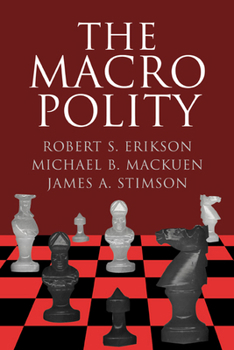The Macro Polity
(Part of the Cambridge Studies in Public Opinion and Political Psychology Series)
Select Format
Select Condition 
Book Overview
The Macro Polity, first published in 2002, provides a comprehensive model of American politics at the system level. Focusing on the interactions between citizen evaluations and preferences, government activity and policy, and how the combined acts of citizens and governments influence one another over time, it integrates understandings of matters such as economic outcomes, presidential approval, partisanship, elections, and government policy-making into a single model. Borrowing from the perspective of macroeconomics, it treats electorates, politicians, and governments as unitary actors, making decisions in response to the behavior of other actors. The macro and longitudinal focus makes it possible to directly connect the behaviors of electorate and government. The surprise of macro-level analysis, emerging anew in every chapter, is that order and rationality dominate explanations. This book argues that the electorates and governments that emerge from these analyses respond to one another in orderly and predictable ways.
Format:Paperback
Language:English
ISBN:0521564859
ISBN13:9780521564854
Release Date:January 2002
Publisher:Cambridge University Press
Length:496 Pages
Weight:1.50 lbs.
Dimensions:1.4" x 5.9" x 8.9"
Customer Reviews
2 ratings
Seminal Work in American Politics
Published by Thriftbooks.com User , 15 years ago
If you really want to understand American politics from some of the best scholars who study it, this is the book to buy. Whether you're interested in voting behavior, political institutions, representation, policy or how they all come together in our American system of government, this is it. A truly seminal work.
An important and innovative work
Published by Thriftbooks.com User , 17 years ago
This is one of the most interesting and important books on public opinion published in recent years. It is a direct descendant of V. O. Key's wonderful little book, "The Responsible Electorate." Erikson et al. explore the dynamics related to the "macro polity." Many works on political behavior and public opinion fo0cus on individuals, using survey research results. This book aggregates the survey results to the level of the citizenry at large, and traces changes (and their effects) in the public mind over time. The authors follow the public mind from the Eisenhower through the Clinton years. On the one hand, this is only a limited slice of American history. On the other hand, this is the period (starting with Eisenhower) when we have the most useful survey data. This is an academic work, and readers need to understand that. To critique this as too academic is to misunderstand the focus and purpose of this work. Nonetheless, even nonacademics can learn a great deal from this work if they persevere. Studies of individual citizens'' attitudes and behavior are not flattering. Individuals are rather ill-informed, don't have a great deal of accurate knowledge of politics, and express attitudes and opinions that they may not really have. But a study of the "macro polity" yields another picture--of a collective wisdom that is far more astute than the individual level data might suggest. That's a key point of this book (as well as others like Page's and Shapiro's "The Rational Public"). On page xxi, the authors state this explicitly: "It is true that individual Americans have a weak grasp on the essentials of economics and economic policy, and it is also true that Americans, in the aggregate, are highly sensitive to real economic performance." In short, ". . .electorates are not myopic. . . ." One of the most important aspects of this work is its demonstration that public policy decisions by government actually seem to be affected by changes in aggregate public political views. By examining the relationship between policy decisions by various government entities (Congress, President, Supreme Court, for example), the authors conclude that (page 314)"Public opinion influences public policy." In an interesting experiment, the authors simulate what would have happened to the public mind, to party control of government, and so on if Jimmy Carter had won re-election in 1980. Chapter 10 is a provocative chapter, exploring "What might have been." All in all, this is one of the more important and well done volumes focusing on public opinion--and its impact on politics (and the effects of politics on public opinion) in recent years. For academics, a great read. For nonacademics, this may be a tougher read, but it would be well worthwhile to persevere.





